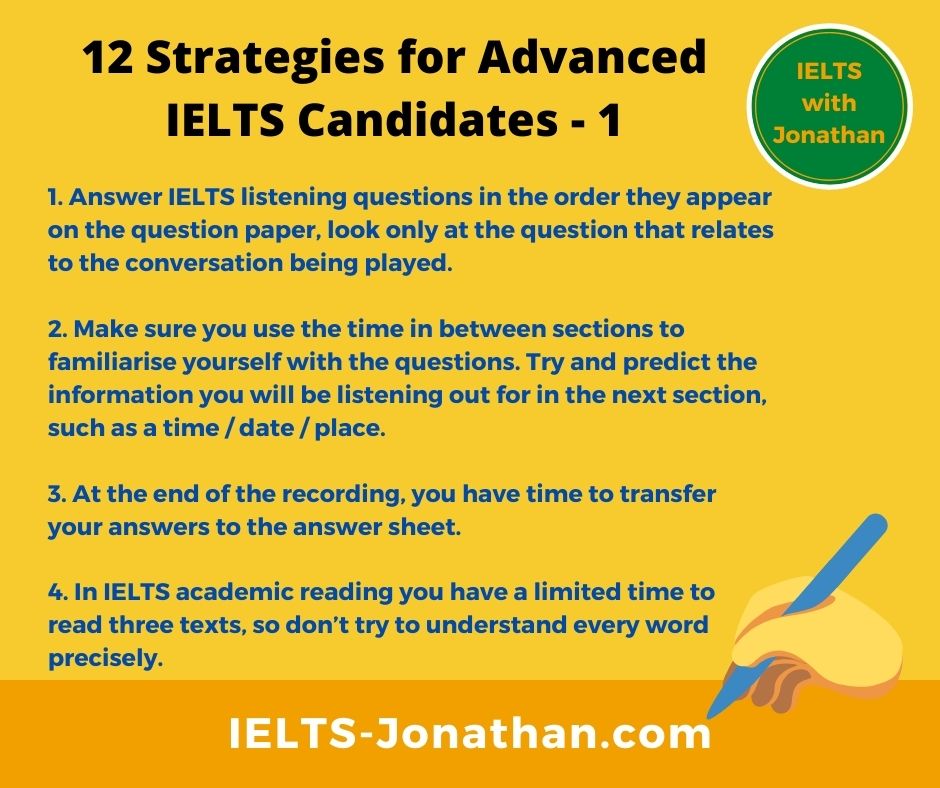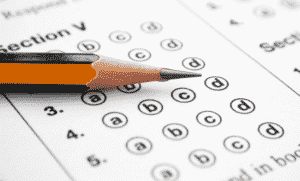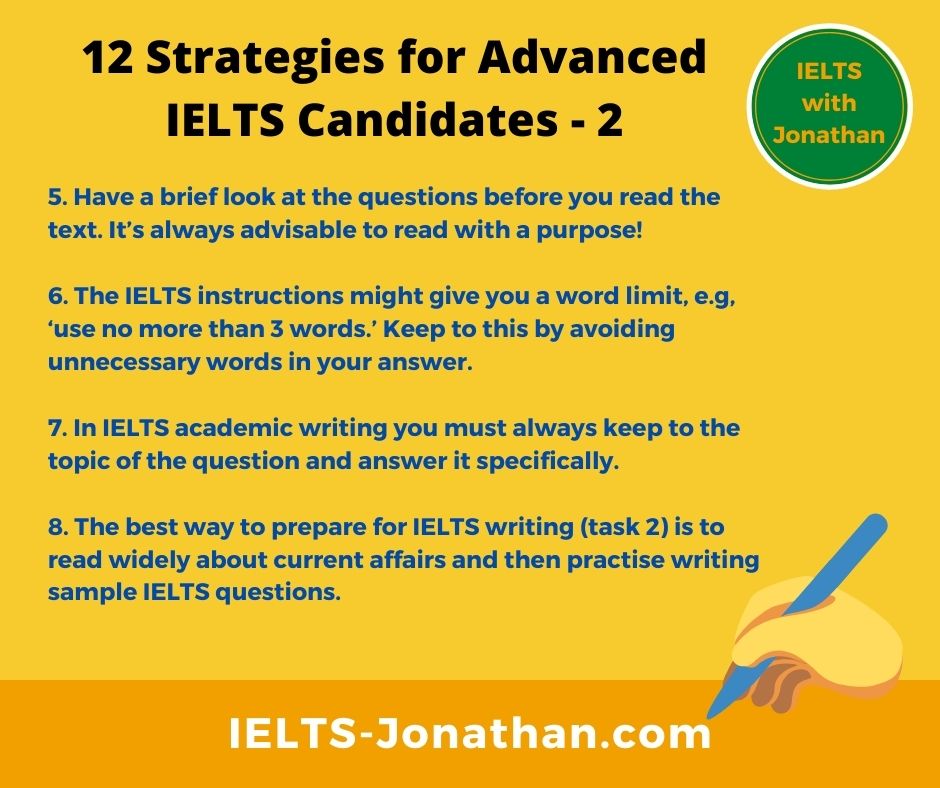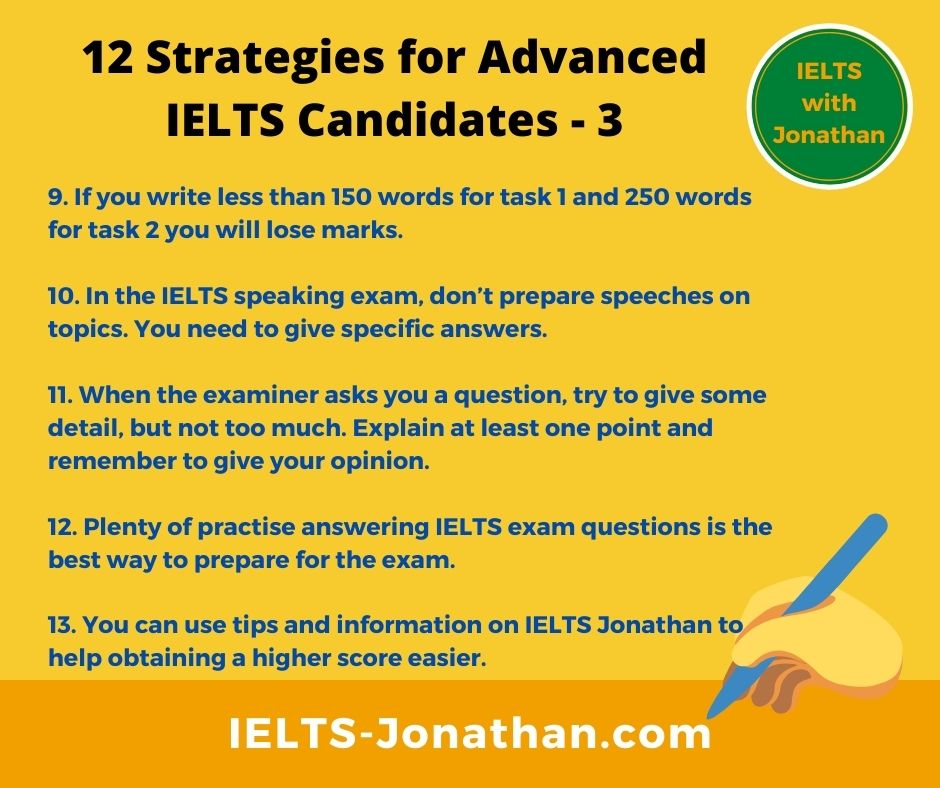12 IELTS Tips for Advanced Students
You may have spent a great deal of time preparing for your exam, and practised your writing, reading and listening at home .
Working in isolation, however, may mean you have forgotten some of the basic strategies that every IELTS candidate needs to know.
If you feel you’re ready for the IELTS test, or even if you’re a native speaker, have a look this collection of important things to remember and do during the exam.
Remember these tips and strategies.
These strategies are the ones that, once in the exam, are often forgotten by even the best candidates.
Listening
1. Answer IELTS listening questions in the order they appear on the question paper, look only at the question that relates to the conversation being played.
Remember that the questions normally follow the order of the information played in the recording, that is, top down. Systematically follow the question paper from top to bottom as the recording plays.
2. Make sure you use the time in between sections to familiarise yourself with the questions. Try and predict the information you will be listening out for in the next section, such as a time / date / place.
If you are familiar with the questions order, you should be able to recognise if you have missed an answer. Move on and listen for the next piece of information.
3. At the end of the recording, you have time to transfer your answers to the answer sheet.
Transfer your answers in the last 10 minutes of the test. Be sure to check your grammar and spelling. You will lose marks if you are inaccurate.
Reading
4. In IELTS academic reading you have a limited time to read three texts, so don’t try to understand every word precisely.
It is not necessary to understand all of the text. The text reads in the order of the questions so there may be large parts of the reading you can simply ignore.
5. Have a brief look at the questions before you read the text. It’s always advisable to read with a purpose!
For example, if one of the questions asks you to match paragraphs with headings, you can write a few words about what the paragraph deals with as you read, to help you identify the correct heading.
6. The IELTS instructions might give you a word limit, e.g, ‘use no more than 3 words.’ Keep to this by avoiding unnecessary words in your answer.
Articles, i.e. the/a/an, count as one word. If an article is not needed for the sentence to make sense then leave them out.
Writing
7. In IELTS academic writing you must always keep to the topic of the question and answer it specifically.
Memorised phrases and out of context sentences are penalised by examiners.
Don’t try to prepare sections of an essay before the exam as these are obvious to the examiner.
Keep on topic!
Study the question carefully, often the simplest ideas are the best, map a basic plan and stick to it.
8. The best way to prepare for IELTS writing (task 2) is to read widely about current affairs and then practise writing sample IELTS questions.
Topic awareness is important. Read newspapers and magazines whenever you get the chance. This will help you to form ideas for your essays and help provide you with the vocabulary.
9. If you write less than 150 words for task 1 and 250 words for task 2 you will lose marks.
There is no strict word limit for either task, only a suggested one.
The word count in IELTS is still important though.
I am happy to read anything between 150 and 200 for a Task 1 report and 250 to 350 for Task 2 essay.
Any more or any less usually means a less coherent or inaccurate report or essay.
Always remember to check your work or spelling and grammar errors before the time is up!
Trying to write too much won’t give you this opportunity.
When you practice, try to stick to the suggested timing rather than the word count.
If you can’t write sufficiently within the time limit, look at you planning and the time you spend thinking about the question.
Is that where the problem is?
Speaking
10. In the IELTS speaking exam, don’t prepare speeches on topics. You need to make sure you answer the specific question you are asked.
Memorised language is penalised.
Remember, you are not being tested on your general knowledge but on your ability to communicate well in different situations.
Part 1 requires short, developed answers.
Part 2 requires you to present your ideas for 2 minutes.
Part 3 requires you to respond to more complicated ideas and concepts.
Slow down and try to organise your ideas in a logical way.
11. When the examiner asks you a question, try to give some detail, but not too much. Explain at least one point and remember to give your opinion.
The examiner wants to hear you talk so give him plenty of opportunities to assess your language.
Don’t respond in an unnatural way!
Where do you live?
I live in a nice part of south London, called Croydon. It’s about 20 minutes to the city centre by tube.
The more you give, the more you are likely to get!
Preparation
12. Plenty of practise answering IELTS exam questions is the best way to prepare for the exam.
There are various books available with past IELTS questions and answer keys that will be a great help if you are planning on taking the exam soon.
There are many online tests you can take, but I only work with official test materials. They provide the same experience as the real test and are free from errors and unnatural test items.
13. You can use tips and information on this website to help make it easier to obtain a higher score.
Remember that even native speakers need to work at learning the language further and preparing for the IELTS to be successful.
Share to someone you know and in the meantime good luck with your preparation!
Jonathan
The Best Approach to Task 2 Writing
Paragraphing in Task 2 Writing
Writing – Benefits of a Foreign University Education
I’m Jonathan
I’ve taught IELTS and University English in more than a dozen universities and schools around the world.
I’m a parent, traveller and passionate about language teaching and helping students achieve their dreams.
Whilst living in Austria or working in Asia, I run IELTS courses to help students get to where they want to be.
If you are serious about IELTS, connect with me to see how I can help you.







Was this helpful? Leave a comment :)